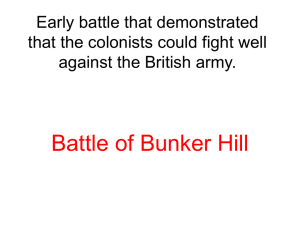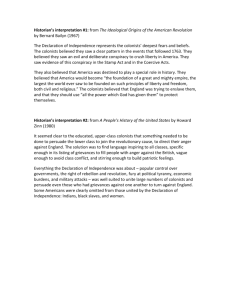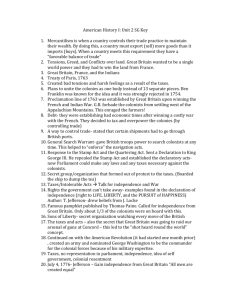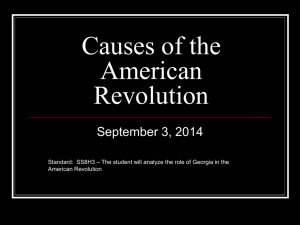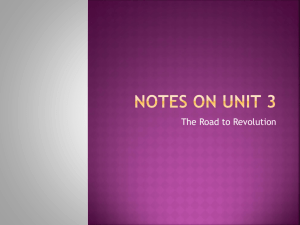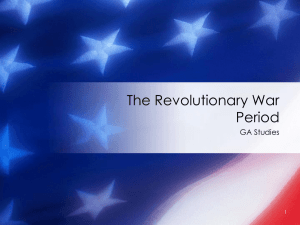revolution-notes - Floyd County Schools
advertisement
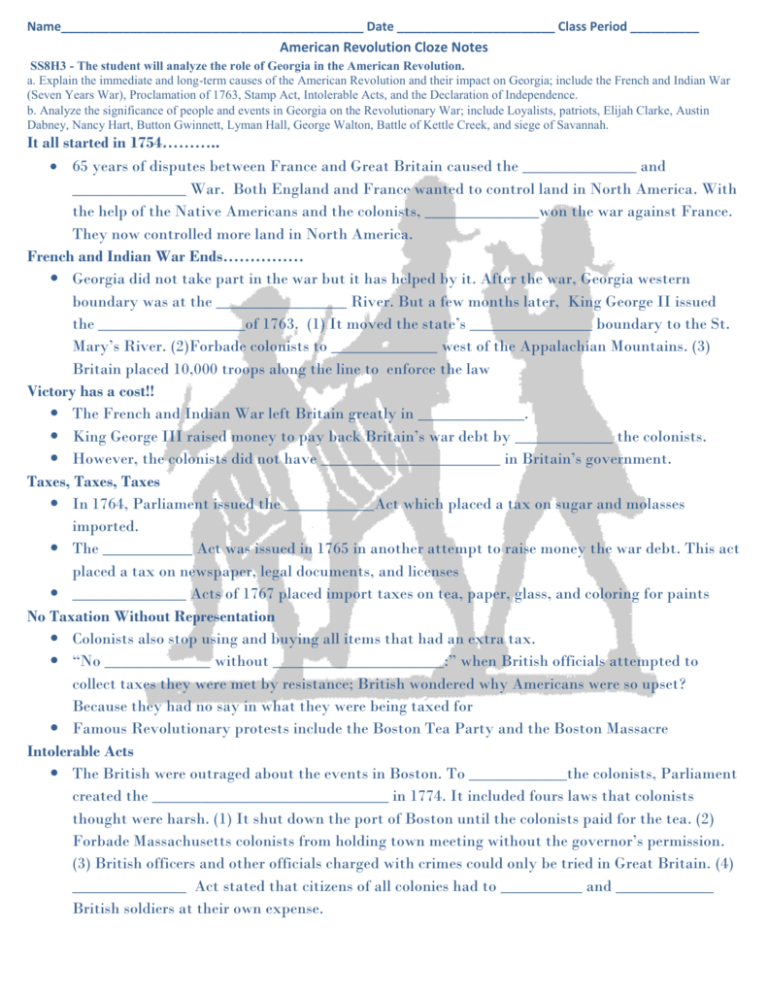
Name____________________________________________ Date _______________________ Class Period __________ American Revolution Cloze Notes SS8H3 - The student will analyze the role of Georgia in the American Revolution. a. Explain the immediate and long-term causes of the American Revolution and their impact on Georgia; include the French and Indian War (Seven Years War), Proclamation of 1763, Stamp Act, Intolerable Acts, and the Declaration of Independence. b. Analyze the significance of people and events in Georgia on the Revolutionary War; include Loyalists, patriots, Elijah Clarke, Austin Dabney, Nancy Hart, Button Gwinnett, Lyman Hall, George Walton, Battle of Kettle Creek, and siege of Savannah. It all started in 1754……….. 65 years of disputes between France and Great Britain caused the ______________ and ______________ War. Both England and France wanted to control land in North America. With the help of the Native Americans and the colonists, ______________won the war against France. They now controlled more land in North America. French and Indian War Ends…………… Georgia did not take part in the war but it has helped by it. After the war, Georgia western boundary was at the ________________ River. But a few months later, King George II issued the __________________of 1763. (1) It moved the state’s _______________ boundary to the St. Mary’s River. (2)Forbade colonists to _____________ west of the Appalachian Mountains. (3) Britain placed 10,000 troops along the line to enforce the law Victory has a cost!! The French and Indian War left Britain greatly in _____________. King George III raised money to pay back Britain’s war debt by ____________ the colonists. However, the colonists did not have ______________________ in Britain’s government. Taxes, Taxes, Taxes In 1764, Parliament issued the ___________Act which placed a tax on sugar and molasses imported. The ___________ Act was issued in 1765 in another attempt to raise money the war debt. This act placed a tax on newspaper, legal documents, and licenses ______________ Acts of 1767 placed import taxes on tea, paper, glass, and coloring for paints No Taxation Without Representation Colonists also stop using and buying all items that had an extra tax. “No _____________ without _____________________:” when British officials attempted to collect taxes they were met by resistance; British wondered why Americans were so upset? Because they had no say in what they were being taxed for Famous Revolutionary protests include the Boston Tea Party and the Boston Massacre Intolerable Acts The British were outraged about the events in Boston. To ____________the colonists, Parliament created the _____________________________ in 1774. It included fours laws that colonists thought were harsh. (1) It shut down the port of Boston until the colonists paid for the tea. (2) Forbade Massachusetts colonists from holding town meeting without the governor’s permission. (3) British officers and other officials charged with crimes could only be tried in Great Britain. (4) ______________ Act stated that citizens of all colonies had to __________ and ____________ British soldiers at their own expense. Response to the Intolerable Acts In Sept. 1774, colonial leaders met in Philadelphia, delegates from 12 colonies gathered in what became known as the 1st ___________________ Congress, only _______________________ did not send representatives. The First Continental Congress agreed to stop all ______________ with Great Britain and wanted each colony to set a committee to enforce __________________. The British are coming”……War Begins The _________________ battles were at Lexington and Concord in Massachusetts. The British planed a secret late night attack to capture weapons. Paul Revere and other riders warned colonists. British lost both battles Declaration of Independence The ____________Continental Congress set up a committee to write a declaration for freedom to King George II. Congress voted that the 13 colonies were “___________ and independent ________________,” on July 4. The Declaration consists of a preamble (introduction) followed by three main parts First part of the Declaration stresses the idea of natural rights, or rights that belong to all people from birth. The second part lists the wrongs committed by Britain and the King. The third part announces that the colonies declare their independence War in Georgia Battle of _____________ ______________took place near Washington, GA. It was led by Colonel __________ ___________. He defeated 800 British troops. Clarke County is named after him. The militia was able to take needed weapons and supplies from the British _________ _____________was a former slave who was injured during the Battle of Kettle Creek after saving Elijah Clarke’s life Throughout the war, Savannah was ____________ by the British. In early October 1779, 15,000 Americans and 4,000 French laid _________ or tried to gain back Savannah. But colonists and French were unsuccessful. The British _________________ Savannah until the end of the war in 1782. After the Battle of Kettle Creek five soldiers came into ________ __________’s home demanding she cook them a meal. The soldiers began to brag about the murder of Colonel John Dooley, which they committed. Hart took their rifles away. She was able to kill one of them and held the other 4 at gunpoint until help arrived. Hart ___________ is named in her honor. It is the only county named after a ______________. The Last Stance………… In October 1781, with the help of France forces, General George Washington defeated British at the Battle of Yorktown. British General Cornwallis _____________________ to American forces The War End……..INDEPENDENCE!!! Under the ____________of ______________ the British recognized the United States as an independent nation, the borders of the new nation _____________ from the Atlantic Ocean to the Mississippi River, the southern border stopped at Florida. Americans agreed to pay ________________for property they lost in the war Reasons for American Victory: difficult for Britain to send troops and supplies to America; when British forces took a city the Americans moved inland: Americans also knew the best roads and places to fight; America also got assistance from Spain and France




